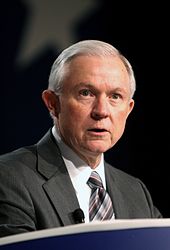 The nation’s largest nontheistic organization is urging the Senate Judiciary Committee to ask the attorney general nominee some hard-hitting questions.
The nation’s largest nontheistic organization is urging the Senate Judiciary Committee to ask the attorney general nominee some hard-hitting questions.
The Freedom From Religion Foundation is very concerned about Alabama Sen. Jeff Sessions’ stated positions on a number of issues affecting the nearly one-fourth of Americans who identify as nonreligious. FFRF Co-Presidents Dan Barker and Annie Laurie Gaylor contacted the members of the Senate Judiciary Committee requesting them to pose to Sessions a number of queries to gain a better understanding of his position on the Establishment Clause.
Sessions has called the constitutional principle of a wall of separation between religion and government a “recent thing that is unhistorical and unconstitutional.” Yet the Establishment Clause of the First Amendment expressly bars government from establishing religion. In fact, the United States was first among nations to adopt a secular Constitution. As attorney general, would he uphold our nation’s proud secular tradition of separating religion from government?
Sessions has also long been a vocal proponent of what he and other proponents of religion call “religious liberty.” Is it his belief that the free exercise of religion is limited to the freedom to worship as one wishes? Or does he propose — as do so many advocates of “religious liberty” — that free exercise includes the freedom to impose one’s religion on others, even if such actions might curtail or violate the civil rights of others, or run contrary to the law?
Sessions has expressed other problematic views. During a panel discussion at the Republican National Convention last July, in reference to Supreme Court Justice Sonia Sotomayor’s comment that “there is no objective stance, but only a series of perspectives,” he reportedly stated, “If you have secularization in the world and don’t believe in a higher being, maybe you don’t believe there is any truth.” Roughly 23 percent of United States citizens, and about 35 percent of Millennials, identify as nonreligious. With a record number of citizens choosing to practice no religion at all, it is critical that any U.S. attorney general be willing to protect the rights of all citizens — not just those in the Christian majority. Is it Sessions’ contention that not believing in a god makes someone categorically an undesirable citizen?
Similarly, in 2001, Sessions admonished Sen. Patrick Leahy, who then chaired the Judiciary Committee, for swearing in witnesses without directing them to recite the phrase “So help me God.” He suggested in a statement that offering witnesses a secular affirmation in place of a religious oath was “another example of the secularization of American public life.” The original text of our Constitution contains no fewer than three references to an “oath or affirmation” that make no mention of swearing to a deity. Article 2, Section 1 provides the complete text of the presidential oath, making no reference to swearing to a deity or placing a hand on a bible. Article VI bars any religious test for any office or public trust. Will Sessions defend the constitutional rights of Americans to choose to affirm, rather than swear religious oaths?
And very importantly, as attorney general would Sessions defend the law of the land even when it conflicts with his personal religious beliefs? Or does he believe that it is the role of the attorney general to reinterpret our country’s laws from his or her own personal religious perspective?
“It’s crucial that our nation’s attorney general recognizes and upholds our nation’s long-established and ‘all-American’ principle of separation between religion and government,” says Gaylor.
FFRF has also signed on to a joint letter to Senate Judiciary Committee Chair Chuck Grassley and Ranking Member Dianne Feinstein, along with 69 reproductive health, rights and justice organizations opposing Sessions.
“Given his long record of hostility toward reproductive rights and his alignment with extreme anti-abortion organizations, we firmly believe that Senator Sessions is not capable of fair and impartial action as attorney general,” the joint letter states. “Especially at this time, the importance of the Department of Justice, and specifically the leadership of the attorney general, in helping to stem the tide of violence against abortion providers cannot be overemphasized.”
The Freedom From Religion Foundation (FFRF), representing more than 26,000 members across the country, has as its purposes the protection of the constitutional principle of separation between religion and government, and the education of the public about nonbelief.
